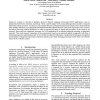Free Online Productivity Tools
i2Speak
i2Symbol
i2OCR
iTex2Img
iWeb2Print
iWeb2Shot
i2Type
iPdf2Split
iPdf2Merge
i2Bopomofo
i2Arabic
i2Style
i2Image
i2PDF
iLatex2Rtf
Sci2ools
122
click to vote
LREC
2008
2008
An Empirical Approach to a Preliminary Successful Identification and Resolution of Temporal Expressions in Spanish News Corpora
Dating of contents is relevant to multiple advanced Natural Language Processing (NLP) applications, such as Information Retrieval or Question Answering. These could be improved by using techniques that consider a temporal dimension in their processes. To achieve it, an accurate detection of temporal expressions in data sources must be firstly done, dealing with them in an appropriated standard format that captures the time value of the expressions once resolved, and allows reasoning without ambiguity, in order to increase the range of search and the quality of the results to be returned. These tasks are completely necessary for NLP applications if an efficient temporal reasoning is afterwards expected. This work presents a typology of time expressions based on an empirical inductive approach, both from a structural perspective and from the point of view of their resolution. Furthermore, a method for the automatic recognition and resolution of temporal expressions in Spanish contents i...
| Added | 29 Oct 2010 |
| Updated | 29 Oct 2010 |
| Type | Conference |
| Year | 2008 |
| Where | LREC |
| Authors | Maria Teresa Vicente-Díez, Doaa Samy, Paloma Martínez |
Comments (0)

